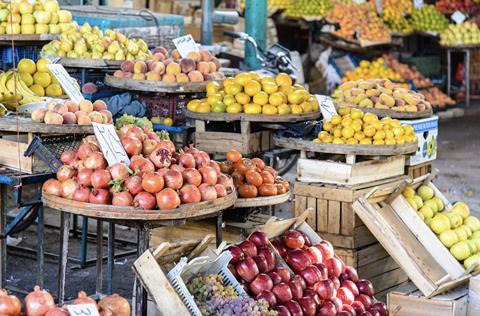The recent conflict with Israel served as a reminder of the vulnerability of the agriculture sector to political and military shocks, according to Alireza Emami of Iran’s Zarrin Group

Agriculture has never been immune to the consequences of conflict, says Alireza (Shahab) Emami, CEO of Zarrin Group. The Iran-Iraq War placed immense pressure on the sector in the ’80s, he recalls, in addition to most other areas of society. Similarly, the recent conflict with Israel has served as a warning to Iran’s farming industry.
The day before a ceasefire was agreed between Israel and Iran after 12 days of military exchanges, Wall Street banks were warning that oil prices could exceed US$100 a barrel were Iran to go ahead with its threat of shutting down the Strait of Hormuz. Meanwhile, concerns over the availability and cost of fertiliser, of which Iran is a key exporter, were rising.
“Wars not only inflict direct damage on the agricultural industry, but also disrupt trade flows, destabilise supply chains and pose significant threats to food security,” says Emami.

During this conflict, operations at key ports temporarily slowed, a concerning development for perishable goods, while the regular process of customs clearance and imports of certain products – already a challenge due to sanctions – faced disruption.
“For years, international shipping companies equipped with reefer containers have ceased cooperation with Iran due to sanctions,” says Emami. “This has made banana imports from South America and the Philippines in reefer containers virtually impossible. Currently, the only active route using refrigerated shipping containers is through India, with transport carried out by Iranian and Indian fleets, outside the realm of international carriers. This has long been one of our key logistical challenges in sourcing tropical fruits.”
The effects of the war extended beyond foreign trade, according to Emami. “The evacuation of major cities led to a mass movement of people to smaller towns, suburban areas, and cities along the Caspian Sea, most of which lack wholesale markets,” he says. “This disrupted domestic supply chains. Given the perishability of fruits, daily transportation is vital, but the conflict brought that flow to a halt.”
Traffic congestion and delays caused by city evacuations resulted in large quantities of fruit being spoiled in transit, while transportation costs also rose. “While harvest schedules and distribution plans were in place, supported by contracts between growers and major buyers, there simply wasn’t enough consumer demand in depopulated urban centres,” says Emami. “This inequality between supply and demand across different regions led to further inefficiencies.”
Since the end of the war, another challenge has emerged for the Iranian produce sector following the mass deportation of Afghan migrants. “They had played an important role as a workforce in both agriculture and construction,” says Emami. “The loss of this affordable labour force has made access to manpower increasingly difficult.”
Nevertheless, he says Zarrin has its sights fixed on the long term. “Despite limited access to global markets, Zarrin Group has consistently prioritised research and development across various domains, and this commitment remains unchanged,” he says. “The 12-day war once again highlighted the vulnerability of the agriculture sector to political and military shocks, underscoring the urgent need to strengthen infrastructure and reduce our dependence on imports of goods for which Iran has a comparative production advantage.”
Advances in water management and the adoption of modern agronomic practices have the potential to quadruple the country’s cultivated area, according to Iranian news site Press TV, allowing for domestic food production to be increased without relying excessively on scarce irrigation resources.



